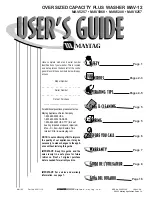
6 - EN
foam, poor rinsing, financial savings and finally,
environmental protection.
• Use lesser detergent for small amounts or
lightly soiled clothes.
• Use concentrated detergents in the
recommended dosage.
Using softeners
Pour the softener into the softener compartment of
the detergent drawer.
• Use the dosages recommended on the
package.
• Do not exceed the (>max<) level marking in the
softener compartment.
• If the softener has lost its fluidity, dilute it with
water before putting it in the detergent drawer.
Using bleaches
• Select a programme with prewash and add
the bleaching agent at the beginning of the
prewash. Do not put detergent in the prewash
compartment.
• Do not use bleaching agent and detergent by
mixing them.
• Use just a little amount (approx. 50 ml) of
bleaching agent and rinse the clothes very
well as it causes skin irritation. Do not pour the
bleaching agent onto the clothes and do not
use it for coloured clothes.
• When using oxygen based bleaches,
follow the instructions on the package and
select a programme that washes at a lower
temperature.
• Oxygen based bleaches can be used together
with detergents; however, if its thickness is
not the same with the detergent, put the
detergent first into the compartment nr. "II"
in the detergent drawer and wait until the
detergent flows while the machine is taking in
water. Add the bleaching agent from the same
compartment while the machine is still taking in
water.
Using limescale remover
• When required, use limescale removers
manufactured specifically for washing machines
only.
• Always follow instructions on the package.
Tips for efficient washing
Light colours and whites
(Recommended temperature
range based on soiling level:
40-90ºC)
Colors
(Recommended
temperature range based
on soiling level: cold-40ºC)
Dark colors
(Recommended
temperature range
based on soiling
level: cold-40ºC)
Delicates/Woolens/
Silks
(Recommended
temperature range
based on soiling level:
cold-30ºC)
Heavily soiled
clothes
(difficult stains
such as
grass, coffee,
fruits and
blood.)
It may be necessary to pre-
treat the stains or perform
prewash. Powder and liquid
detergents recommended
for whites can be used at
dosages recommended for
heavily soiled clothes. It is
recommended to use powder
detergents to clean clay and
soil stains and the stains that
are sensitive to bleaches.
Powder and liquid
detergents recommended
for colours can be used at
dosages recommended
for heavily soiled clothes.
It is recommended to use
powder detergents to
clean clay and soil stains
and the stains that are
sensitive to bleaches. Use
detergents without bleach.
Liquid detergents
suitable for
colours and dark
colours can be
used at dosages
recommended
for heavily soiled
clothes.
Prefer liquid detergents
produced for delicate
clothes. Woollen and
silk clothes must be
washed with special
woollen detergents.
Normally
soiled clothes
(For example,
stains caused
by body on
collars and
cuffs)
Powder and liquid detergents
recommended for whites
can be used at dosages
recommended for normally
soiled clothes.
Powder and liquid
detergents recommended
for colours can be used at
dosages recommended
for normally soiled clothes.
Use detergents without
bleach.
Liquid detergents
suitable for
colours and dark
colours can be
used at dosages
recommended for
normally soiled
clothes.
Prefer liquid detergents
produced for delicate
clothes. Woollen and
silk clothes must be
washed with special
woollen detergents.
Lightly soiled
clothes
(No visible
stains exist.)
Powder and liquid detergents
recommended for whites
can be used at dosages
recommended for lightly
soiled clothes.
Powder and liquid
detergents recommended
for colours can be used at
dosages recommended for
lightly soiled clothes. Use
detergents without bleach.
Liquid detergents
suitable for
colours and dark
colours can be
used at dosages
recommended
for lightly soiled
clothes.
Prefer liquid detergents
produced for delicate
clothes. Woollen and
silk clothes must be
washed with special
woollen detergents.







































